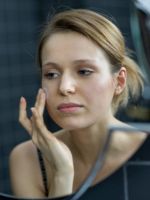By Theresa Tamkins
 scare-moisturizer-150.jpg suggests that some common moisturizers might speed up the development of skin cancer—at least in laboratory mice.
scare-moisturizer-150.jpg suggests that some common moisturizers might speed up the development of skin cancer—at least in laboratory mice.
Don’t throw out your lotions and creams just yet, though. More work is needed to determine what this means for human moisturizer users, according to Allan Conney, PhD, the senior investigator of the study published Thursday in Journal of Investigative Dermatology. Moisturizers are medically necessary for some people, and animal studies don't directly point to human risk.
At most, the study is a "red flag that there could be a potential problem," says Conney, who is the director of the laboratory for cancer research at the Rutgers University School of Pharmacy in Piscataway, N.J.
What the study found
Ironically, Conney and his colleagues went down this path because previous research suggested caffeine might protect against cancer if it was rubbed on the skin.
They assumed that commercially available moisturizer would be a good way to deliver caffeine to the skin of mice, until they discovered a side effect.
In the new study, the researchers exposed hairless mice to ultraviolet light twice a week for 20 weeks, which increased the animals' risk of skin cancer. They applied either nothing, water, or one of four different creams—Dermabase, Dermovan, Eucerin Original Moisturizing Cream, or Vanicream—to the skin of the mice. This went on 5 days a week for an additional 17 weeks (the model is meant to mimic a common human pattern: sunlight exposure in childhood, followed by an adulthood with less sun exposure.)
About 81% of the mice treated with water or nothing developed some type of skin tumor—squamous cell carcinoma or other easy-to-treat tumors, not the more dangerous melanomas—from ultraviolet light exposure. For those with cream, the cancer incidence ranged from slightly lower (79%) to significantly higher (90%), depending on the type of cream.
In addition, the size of the tumors developed more rapidly and were larger in the moisturizer-treated mice than in controls—40.6 to 51.3 cubic millimeters, as opposed to 27.3 cubic millimeters in the untreated mice.
The researchers speculate that certain moisturizer ingredients, such as sodium lauryl sulfate and mineral oil, might be to blame because they can act as irritants.
So what does it mean?
“You simply cannot make a comparison from the animal model they used to humans,” says Doris Day, MD, a clinical assistant professor of dermatology at New York University Medical Center.
“For all we know, using moisturizers [in humans] has improved skin health and has been protective against skin cancer," she says. "There is simply no correlation that can be made, that's the bottom line.” (Dr. Day was not involved in the study.)
Karol Sikora, MD, PhD, medical director of Cancer Partners UK, notes that the differences between the various creams applied to the mice are actually very small—and the exposure to UV risk was very high.
“This is a pretty artificial situation with the mouse skin primed by a lot of UV light to develop cancer,” Dr. Sikora said in a statement released by the Science Media Center, a UK-based group that communicates scientific views.
Conney says more research is necessary, this time in humans. He says it would be helpful to look at studies in humans who use moisturizer and those who don’t to see whose skin-cancer risk is higher.
Sorting out your skin priorities
Dr. Day doesn’t recommend moisturizers for all her patients because not everyone needs one, she says. But she finds that most people—especially those older than 30—do need moisturizer on their face. "Most people, even in their 20s, have dry skin on their legs, especially in the winter, and do need to moisturize there," she says. However, says Dr. Day, “You only need to moisturize if your skin needs it. Those with oily skin don't need to add extra moisturizing."
But everyoneshould be concerned about skin cancer and sun exposure, Dr. Day adds.
As for the skin-cream controversy, Conney says, "It would be nice if the companies could do more in terms of testing their products."
In any case, those companies may face some new competition in the future.
Conney says that the research team asked Johnson & Johnson to develop a cream that excluded certain ingredients. They called it “custom blend cream” in their study, and it didn’t seem to increase the percentage of mice with tumors or the size of the tumors that did develop.
Rutgers University and the pharmaceutical company have filed a joint patent on the cream, Conney says.
The manufacturers of Eucerin and Dermabase did not return phone calls for comment by the time of publication.
